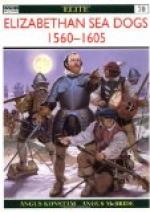The fleet made for Corunna, where Norreys won a brilliant victory. A curious little incident of exact punctilio is worth recording. After the battle, and when the fleet was waiting for a fair wind to get out of the harbor, the ships were much annoyed by a battery on the heights. Norreys undertook to storm the works and sent in the usual summons by a parlementaire accompanied by a drummer. An angry Spaniard fired from the walls and the drummer fell dead. The English had hostages on whom to take reprisals. But the Spaniards were too quick for them. Within ten minutes the guilty man was tried inside the fort by drum-head court-martial, condemned to death, and swung out neatly from the walls, while a polite Spanish officer came over to assure the English troops that such a breach of discipline should not occur again.
Lisbon was a failure. The troops landed and marched over the ground north of Lisbon where Wellington in a later day made works whose fame has caused their memory to become an allusion in English literature for any impregnable base—the Lines of Torres Vedras. The fleet and the army now lost touch with each other; and that was the ruin of them all. Norreys was persuaded by Don Antonio, pretender to the throne of Portugal which Philip had seized, to march farther inland, where Portuguese patriots were said to be ready to rise en masse. This Antonio was a great talker and a first-rate fighter with his tongue. But his Portuguese followers, also great talkers, wanted to see a victory won by arms before they rose.
Before leaving Lisbon Drake had one stroke of good luck. A Spanish convoy brought in a Hanseatic Dutch and German fleet of merchantmen loaded down with contraband of war destined for Philip’s new Armada. Drake swooped on it immediately and took sixty well-found ships. Then he went west to the Azores, looking for what he called ’some comfortable little dew of Heaven,’ that is, of course, more prizes of a richer kind. But sickness broke out. The men died off like flies. Storms completed the discomfiture. And the expedition got home with a great deal less than half its strength in men and not enough in value to pay for its expenses. It was held to have failed; and Drake lost favor.
* * * * *
With the sun of Drake’s glory in eclipse at court and with Spain and England resting from warfare on the grander scale, there were no more big battles the following year. But the year after that, 1591, is rendered famous in the annals of the sea by Sir Richard Grenville’s fight in Drake’s old flagship, the Revenge. This is the immortal battle of ‘the one and the fifty-three’ from which Raleigh’s prose and Tennyson’s verse have made a glory of the pen fit to match the glory of the sword.
Grenville had sat, with Drake and Sir Philip Sidney, on the Parliamentary committee which recommended the royal charter granted to Sir Walter Raleigh for the founding of the first English colony in what is now the United States. Grenville’s grandfather, Marshal of Calais to Henry VIII, had the faculty of rhyme, and, in a set of verses very popular in their own day, showed what the Grenville family ambitions were.




